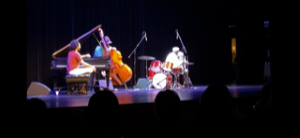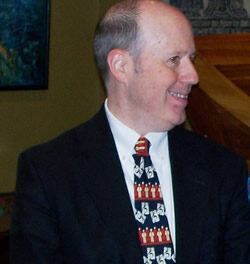The Winston-Salem Symphony opened its 65th season with a program of Romantic favorites – Grieg’s Piano Concerto in A minor and Brahms’ Symphony No. 4 in E minor under the direction of Robert Moody, Music Director. The concert opened with French composer Paul Dukas’ Fanfare, composed to precede his choreographic poem, La Péri.
A dozen brass players lined up across the proscenium of the Stevens Center while conductor Moody led the group from the audience, invisible from the balcony. While the visual element of the brass (“in your face”) was impressive, acoustically it was unfortunate – the instruments did not blend and the player whose bell faced me was far louder than one who faced another part of the hall. Winners, sound-wise, were the horns whose sound comes out sideways, bouncing off walls before reaching the audience, but the balance suffered from the exaggerated directionality of the stage apron. This said, they were impeccably together in this unusually brisk version of this often performed fanfare.
Orion Weiss, a twenty-something American pianist, was the brilliant soloist in Edvard Grieg’s Piano Concerto in A minor, a warhorse played sparingly in recent years, but a thrilling concerto nonetheless. Soloist and conductor were of a like mind from the opening drum-roll until the final chord except for some sluggishness in the second movement. Clearly influenced by Schumann’s quintessential concerto in the same key and smacking of Liszt in thematic development, Grieg’s masterpiece features the solo piano in numerous solo episodes in both outer movements. The middle slow movement, Adagio, was poetic after the tumultuous and stormy first movement, and the last movement lilted along with catchy rhythms. The audience applauded loudly and was rewarded with two very similar encores, not clearly announced for those of us in the balcony.
Hundreds of pieces for all combinations of instruments and voices have been composed to commemorate the victims of September 11, 2001. Instead, Maestro Moody chose to play the work which opened the Winston-Salem Symphony’s postponed subscription concert on Thursday, September 13, 2001, the somber and profound lament from Samuel Barber’s Second String Quartet, the Adagio for Strings. This was a magnificent performance, perhaps the best I have ever heard. Moody has a passionate understanding of the drama and pathos of this heart-rending work – the timing was superb, especially the hugely portentous and pregnant pause following the rending shriek of the climax of the work. Bravo!
The Brahms symphony was a different matter. This performance of one of the masterpieces of orchestral literature felt superficial. No secrets (e.g. the canons which start at the very beginning of the piece) were revealed or hinted at. After-the-beat phrases were chopped (six times) and sudden tempo changes were inserted without cause. Unlike Mahler, whose face value is the music, Brahms is full of hidden secrets which need to be teased out, balanced and lovingly cared for. The episodic treatment of many passages contributed to the lack of continuity and integrity of the movements and even of the grander cohesion of the work.
Still, there were many good things – the horns shone all evening long, as did the bassoons and the clarinets. The string sound was warm and well balanced. And the program was well chosen, although the after-thought inclusion of the 9/11 tribute might have been better incorporated.
The concert was dedicated to the memory of the late Mark Popkin, principal bassoon of the Winston-Salem Symphony for three decades and a legend in the hallowed halls of Bassoonery. Mr. Popkin passed away during this summer.












